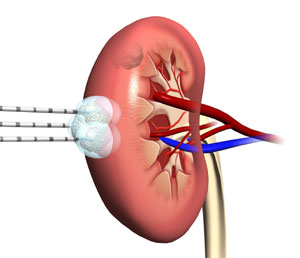Recently, ablative techniques, such as radiofrequency ablation (RFA) and cryoablation, have taken a more prominent role in the treatment of Kidney Cancer
According to the Society of Interventional Radialogists “Kidney cancer is the eighth most common cancer in men and the tenth in women.” The most common type of kidney cancer is renal cell carcinoma that forms in the lining of the renal tubules in the kidney that filter the blood and produce urine. Approximately 85 percent of kidney tumors are renal cell carcinomas. When kidney cancer spreads outside the organ, it can often be found in nearby lymph nodes, lungs, bones or liver, as well as the other kidney.”
Like most cancers, diagnosis at an early stage offers much different therapy and prognosis information than does diagnosis at later stages.

Cryoablation for kidney cancer is an FDA approved kidney cancer therapy that may offer benefits over conventional chemotherapy and radiation or even conventional surgery. Your stage at diagnosis is important.
I am both a cancer survivor and cancer coach. For more information on both conventional and non-conventional kidney cancer therapies, scroll down the page, post a question or a comment and I will reply ASAP.
Thank you,
David Emerson
- Cancer Survivor
- Cancer Coach
- Director PeopleBeatingCancer
“CONCLUSION: Cryoablation presents a feasible treatment for patients with small renal masses. Only short-term data are available and, as such, meaningful conclusions regarding long-term cancer control cannot be made. More rigorous studies are needed.
“CONCLUSION: After renal cryoablation, MR imaging revealed common signal characteristics such as low-signal-intensity rims on T2-weighted images, enhancement patterns such as thin peripheral rims, and interval size changes.”
“CONCLUSIONS: Midterm followup of percutaneous renal cryoablation shows durability of this treatment method with a low incidence of tumor recurrence beyond 3 months.”
“CONCLUSION: Percutaneous cryoablation with US guidance and CT monitoring is safe and effective for the treatment of solid renal tumors. Longer follow-up should provide further proof of the effectiveness of this technique.”



